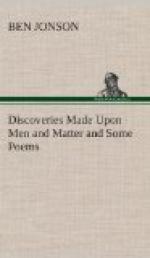4. Lectio.—Parnassus.—Helicon.—Arscoron.—M. T. Cicero.— Simylus.—Stob.—Horat.—Aristot.—But that which we especially require in him is an exactness of study and multiplicity of reading, which maketh a full man, not alone enabling him to know the history or argument of a poem and to report it, but so to master the matter and style, as to show he knows how to handle, place, or dispose of either with elegancy when need shall be. And not think he can leap forth suddenly a poet by dreaming he hath been in Parnassus, or having washed his lips, as they say, in Helicon. There goes more to his making than so; for to nature, exercise, imitation, and study art must be added to make all these perfect. And though these challenge to themselves much in the making up of our maker, it is Art only can lead him to perfection, and leave him there in possession, as planted by her hand. It is the assertion of Tully, if to an excellent nature there happen an accession or conformation of learning and discipline, there will then remain somewhat noble and singular. For, as Simylus saith in Stobaeus, [Greek text], without art nature can never be perfect; and without nature art can claim no being. But our poet must beware that his study be not only to learn of himself; for he that shall affect to do that confesseth his ever having a fool to his master. He must read many, but ever the best and choicest; those that can teach him anything he must ever account his masters, and reverence. Among whom Horace and (he that taught him) Aristotle deserved to be the first in estimation. Aristotle was the first accurate critic and truest judge—nay, the greatest philosopher the world ever had—for he noted the vices of all knowledges in all creatures, and out of many men’s perfections in a science he formed still one art. So he taught us two offices together, how we ought to judge rightly of others, and what we ought to imitate specially in ourselves. But all this in vain without a natural wit and a poetical nature in chief. For no man, so soon as he knows this or reads it, shall be able to write the better; but as he is adapted to it by nature, he shall grow the perfecter writer. He must have civil prudence and eloquence, and that whole; not taken up by snatches or pieces in sentences or remnants when he will handle business or carry counsels, as if he came then out of the declaimer’s gallery, or shadow furnished but out of the body of the State, which commonly is the school of men.
Virorum schola respub.—Lysippus.—Apelles.—Naevius.—The poet is the nearest borderer upon the orator, and expresseth all his virtues, though he be tied more to numbers, is his equal in ornament, and above him in his strengths. And (of the kind) the comic comes nearest; because in moving the minds of men, and stirring of affections (in which oratory shows, and especially approves her eminence), he chiefly excels. What figure of a body was Lysippus ever




